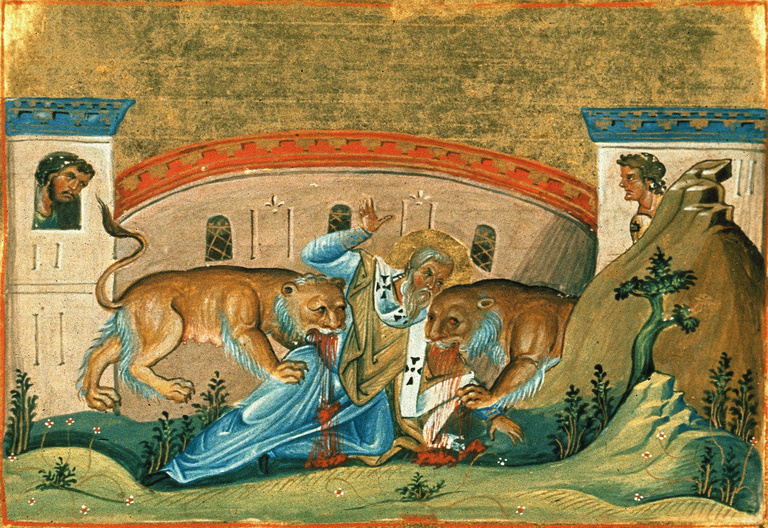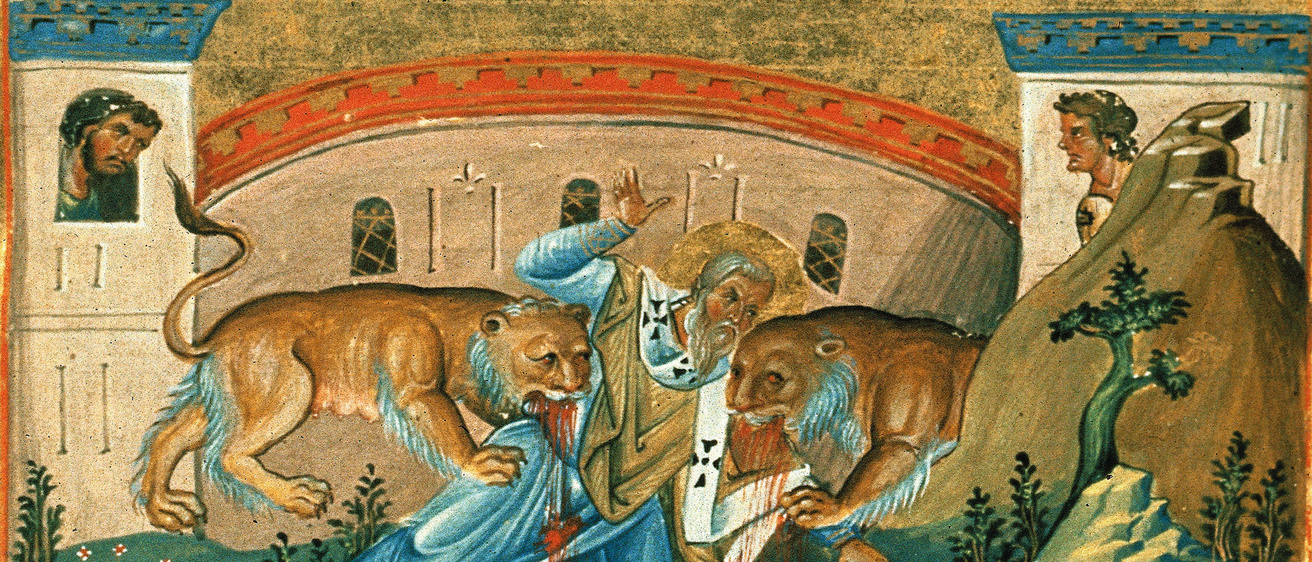
Ignatius, bishop of Antioch in Syria (early 2nd C. CE), is one of the first Christians that we know of to be executed by Rome. But there is one thing that distinguishes him from many early martyrs—his apparent zeal for death. In one of his letters, he writes:
"May I have the full pleasure of the wild beasts prepared for me; I pray they will be found ready for me. Indeed, I will coax them to devour me quickly—not as happens with some, whom they are afraid to touch. And even if they do not wish to do so willingly, I will force them to it … Fire and cross and packs of wild beasts, cuttings and being torn apart, the scattering of bones, the mangling of limbs, the grinding of the whole body, the evil torments of the devil—let them come upon me, only that I may attain to Jesus Christ." — Ignatius, Letter to the Romans 5.2–3[1]
It is not just the desire with which Ignatius looks forward to the ravenous beasts awaiting him in Rome (IgnEph 1.2, 21.2), but that he says he will force them to kill and consume his body if they aren't willing. We tend to think of martyrs today as being a bit more passive. But notice also how graphically Ignatius describes his fate.
Ignatius writes this letter to the Roman community around August 24, 110 CE. The other letters he wrote were to his own communities, but this one was written to the community at the site of his execution. He pleads:
"For the beginning is auspicious, if I can indeed obtain the gracious gift I need in order to receive my lot without any impediment. For I am afraid of your love, that it may do me harm. For it is easy for you to do what you want, but it is difficult for me to attain to God, if you do not spare me…
Even if I urge you otherwise when I arrive, do not be persuaded; instead be persuaded by what I am writing you now. For I write to you while living, desiring to die. My passion has been crucified and there is no burning love within me for material things;" — Ignatius, Letter to the Romans 1.2, 7.2
If we were feeling Shakespearean, we might argue he "doth protest too much." It is reasonable to assume that he is nervous and worried about being thrown to beasts. He worries he might accept a way out if offered—and who wouldn't? But, Ignatius clearly sees this death as the best possible fate he could hope for.
So, why would Ignatius have such a zealous desire to face this sort of gruesome and graphic ending? Here we actually have several other roughly contemporary works that will help us place Ignatius within his ideological context.
Death as Victory
The dualistic split between the temporary body and immortal soul, popularized by Plato around 360 BCE to depict the willingly executed Socrates as the ideal champion, would be used by many later groups to depict their sufferings and executions as victories. There was another form of dualism that was even more prevalent among early Jewish and Christian communities—apocalyptic dualism. Similar to philosophical dualism, the material world and bodies in which we live are believed to be inferior to what is coming next. However, one major difference from philosophical dualism is that apocalyptic dualism also sees this world as evil and an active antagonist.
The biblical Apocalypse of John, better known as the Book of Revelation—the most famous apocalyptic work that lends its name to the genre—provides a good context for Ignatius since it is written just before his letters. Revelation also begins with letters to seven churches that are in the same region as Ignatius's letters. In fact, both contain letters to Ephesus (modern Efes, Turkey), Philadelphia (modern Alaşehir, Turkey), and Smyrna (modern İzmir, Turkey).
Revelation describes the coming apocalyptic war in which the powers of this world and Satan are destroyed and burned as eternal sacrifices. Those who remain obedient until the end are called "conquerors" (Revelation 3:5), though it is unclear exactly what that means. The only humans who are singled out in any way are those who are slaughtered and those who are beheaded for their testimony. These and the others who are resurrected and judged worthy are branded with Jesus's seal and brought into the paradise of the new Jerusalem.
Ignatius shows a similar view about Christian identity. He argues:
"For me, ask only that I have power both inside and out, that I not only speak but also have the desire, that I not only be called a Christian but also be found one. For if I be found a Christian, I can also be called one and then be faithful—when I am no longer visible in the world." — Ignatius, Letter to the Romans 3.2
"Then I will truly be a disciple of Jesus Christ, when the world does not see even my body … But if I suffer, I will become a freed person who belongs to Jesus Christ, and I will rise up, free, in him. In the meantime I am learning to desire nothing while in chains." — Ignatius, Letter to the Romans 4.2–3
"Grant this to me; I know what benefits me. Now I am beginning to be a disciple. May nothing visible or invisible show any envy toward me, that I may attain to Jesus Christ." — Ignatius, Letter to the Romans 5.3
"Grant this to me, brothers: Do not keep me from living; do not wish me to die; do not hand over to the world the one who wants to belong to God or deceive him by what is material." — Ignatius, Letter to the Romans 6.2
While in this evil world Ignatius believed he could never reach his full potential; his death would remove those barriers. He believed this type of death in particular, though, allowed him to become a true Christian.
But how does a martyr's death equate to victory? Or, borrowing Revelation's terms, how do those slaughtered and beheaded for their testimony become conquerors?
Human Self-Sacrifice
The Book of Revelation can also help us understand the sacrificial language that Ignatius uses. Those who are slaughtered for their testimony are purified by their deaths—their blood purifying their "clothing" to "make their robes white" (cf. Revelation 6:11). Once their robes are purified, they join the divine army of the Word, although they are mostly the hype band that sings his special victory song (cf. Revelation 14:1–5). Their purity is best demonstrated by their presence in the altar of heaven (Revelation 6:9–11).
We find specifically sacrificial language in other Jewish and Christian works written around this time. The Epistle to the Hebrews (neither a letter nor written by Paul) is a homily that uses Platonic dualism to depict Judaism as merely an inferior copy or image of the truly divine Jesus. Written around the end of the 1st century CE, it describes Jesus's death as follows:
Therefore he had to become like his brothers and sisters in every respect, so that he might be a merciful and faithful high priest in the service of God, to make a sacrifice of atonement for the sins of the people. — Hebrews 2:17
As the true high priest, Jesus offered himself as a sacrifice to purify humanity.
The Jewish philosophical work 4 Maccabees, also written by the end of the 1st century CE, lauds the Maccabean martyrs—the elderly Eleazar, the (possibly) widowed mother, and her seven sons from 2 Maccabees 6–7—as the true embodiment of Hellenistic virtues. It describes their deaths:
"Be merciful to your people, and let our punishment suffice for them. Make my blood their purification, and take my life in exchange for theirs." — 4 Maccabees 6:28–29
"The tyrant was punished, and the homeland purified—they having become, as it were, a ransom for the sin of our nation. And through the blood of those devout ones and their death as an atoning sacrifice, divine Providence preserved Israel that previously had been mistreated." — 4 Maccabees 17:21–22
Their deaths are sacrifices that would help to purify the nation so that they could win the Maccabean Revolt and purify themselves so that they could enjoy the afterlife.
We can use this context to examine Ignatius's discussion of sacrifice:
But grant me nothing more than to be poured out as a libation to God while there is still an altar at hand ... Petition Christ on my behalf, that I may be found a sacrifice through these instruments of God. — Ignatius, Letter to the Romans 2.2, 4.2
Like these others, he sees this particular death as a sacrifice that purifies him, allowing him to become a true Christian.
Food as Sacrifice
This finally brings us to the most graphic metaphors Ignatius uses to describe his death. He pleads:
"I urge you, do not become an untimely kindness to me. Allow me to be bread for the wild beasts; through them I am able to attain to God. I am the wheat of God and am ground by the teeth of the wild beasts, that I may be found to be the pure bread of Christ." — Ignatius, Letter to the Romans 4.1
He is food. This could just be a macabre way to describe his coming death at the hands of beasts, but the inclusion of "bread of Christ" provides a clue and reminds us that we are dealing with dualistic ideology. He further explains:
"I have no pleasure in the food that perishes nor in the pleasures of this life. I desire the bread of God, which is the flesh of Jesus Christ, from the seed of David; and for drink I desire his blood, which is imperishable love." — Ignatius, Letter to the Romans 7.3
Here he makes the connection clear by revealing the unifying symbol—the Eucharist. In the Synoptic Gospels, Jesus shares a Passover meal with his disciples and compares his soon-to-be-crucified body and blood to the rituals that will shield them from the angel of death (cf. Matthew 26:17–30, Mark 14:12–26, Luke 22:7–39). Thus, on the purely physical and evil level of the material world, his body is food for beasts, but on the divine level it becomes the purifying Eucharist.
Ignatius's graphic descriptions of his desire for death sounds pathological to modern ears, but it fits ideologically with other Jewish and Christian works around the end of the 1st and early 2nd century CE. The right type of death undertaken to remain obedient to God acted as a sacrifice that purified them in preparation for the resurrection. We cannot know how much of this he sincerely believed or how much he was trying to talk himself into feeling this way, but he is definitely making some lemonade with his unavoidable fate.
[1] "The Letter of Ignatius to the Romans," from The Apostolic Fathers, translated by Bart D. Ehrman. Loeb Classical Library; 2003.
